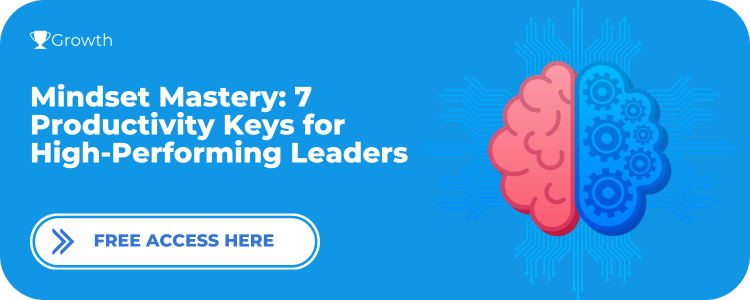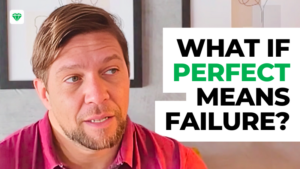✅ FREE ACCESS: Mindset Mastery: 7 Productivity Keys For High-Performing Leaders
What habits make the difference in the extraordinary results achieved by the world’s most successful entrepreneurs?
To answer this question, Napoleon Hill, spent 20 years of his life interviewing the wealthiest entrepreneurs of his time, like Thomas Edison, Henry Ford, and John Rockefeller.
That resulted in 13 habits of highly successful entrepreneurs explored in his book: Think and Grow Rich.
Today, we’re going to learn 6 of these 13 success habits and a step-by-step process to start cultivating them now.
But before we get into it, make sure you grant your lifetime access to our free eBook:
Mindset Mastery: 7 Productivity Keys for High-Performing Leaders.
This is your chance to learn specific mindset shift techniques to achieve extraordinary results.
Habits of Successful Entrepreneurs: The Method
Let’s unfold all 13 success habits by Napoleon Hill using a 2-steps method:
- Step 1: Definition
- Step 2: How to apply
The idea is to don’t focus too much on understanding the concepts, but on knowing how to turn them into a habit.
Habit #1: Desire
The first of the 13 Habits of Successful Entrepreneurs is desire.
Napoleon Hill said:
“Every person who wins in any undertaking must be willing to burn his ships and cut all sources of retreat. Only by doing so can one be sure of maintaining that state of mind known as a burning desire to win, essential to success.”
Weak desires bring weak results, just as a small amount of fire makes a small amount of heat.
Napoleon Hill’s research highlights that desire is not a fleeting emotion; it’s a powerful force that can drive individuals to transcend their limitations and achieve extraordinary results.
How to apply
First of all, desire is not longing. Desire is commitment. If there’s no action, there’s no desire, only interest.
The second is that you can’t drive yourself to desire something. Desire grabs you.
What you need to do is to identify your sources of desire and orient yourself in that direction.
The simplest way to find what drives your desire is to ask yourself these 3 questions:
- What’s the one thing I’ve been doing since I can remember myself?
- What do I do that other people say I’m good at?
- What inspires me when I see it in others?
The intersections of these 3 answers are sources of desire for you.
The most successful version of your future lies in the choice you make today to orient your life in the direction of this everlasting flame.
Start small, start bad, but start today.
Habit #2: Faith
The second of the 13 Habits of Successful Entrepreneurs is Faith.
Here is how Napoleon Hill defines faith:
“Faith is the visualization of and belief in the attainment of desire.”
Faith acts as a powerful force that shapes your thoughts, actions, and outcomes.
It helps you overcome doubts, fears, and setbacks by maintaining a steadfast belief in your ability to do what you set out to do.
That’s necessary because persistence is an essential factor to turn desire into its monetary equal.
If you take Thomas Edison’s development of the light bulb as an example, he tried thousands of times before he was able to create the first functional version of it.
One of his most famous quotes is:
“I have not failed. I’ve just found 10,000 ways that won’t work”
By understanding the significance of faith and incorporating it into your mindset, you can align your thoughts, emotions, and actions to support the manifestation of your goals and aspirations.
How to apply:
Faith is part of a collective belief system. We need to act it out based on what we believe and we have to do it with other people.
So let’s break this down properly.
- It’s a belief system.
- It’s Collective.
As a belief system, we must…
Understand the difference between mistakes and failures.
Mistakes are the things you didn’t know would go wrong and failures are the things you knew all along would go wrong.
Mistakes are miscalculations and failures are negligence.
So every failure is designed by negligence. There’s no learning in failure because you were like that from the beginning. There’s no novelty.
Mistakes, on the other hand, are the most informative streams of media you will ever encounter.
Because by pushing yourself beyond the limits of your current capacity, you make miscalculations that produce obstacles.
Those obstacles are made of new pieces of information, and information means in-formation.
That means, every time you make a mistake, you become something more, something better.
So, a productive belief system is grounded on avoiding failures and embracing mistakes.
How to avoid failures:
Don’t do the things you don’t want to become. Maybe you don’t know what you want to be but are pretty sure what you don’t want to be. So don’t do that.
Everything you do grows and everything you avoid shrinks inside of you.
How to embrace mistakes:
Tell the truth, especially to yourself, and don’t protect yourself from awkwardness.
It’s painful but it’s also a place of growth.
That’s why Edison said he had not failed. He found 10,000 ways that didn’t work. 10k mistakes.
If you learn from your mistakes, you become an unstoppable force.
You acquire an overwhelming faith in what can be, instead of being shaken by what it is, especially when things are not going as expected.
The second aspect of faith is that it is collective.
Good company is the gateway for faster improvement.
If you live around 10 successful people, you will be the 11th. That happens because we don’t learn new habits, we copy new habits from people around us.
You tell what you live for by telling who you live with.
Surround yourself with individuals who believe in you and your goals. Seek out supportive communities, mentors, or like-minded individuals who can provide encouragement and reinforce your faith.
If you want to be a wolf, you need to be part of a pack.
Habit #3: Auto-suggestion
The third of the 13 Habits of Successful Entrepreneurs is auto-suggestion.
Here’s how Napoleon Hill defines it:
“Auto-Suggestion is a term that applies to all suggestions and all self-administered stimuli that reach one’s mind through the five senses.”
It involves implanting empowering beliefs and ideas into the subconscious mind to shape one’s thoughts, behaviors, and ultimately, reality.
Auto-Suggestion can be employed to overcome limiting beliefs and instill empowering thoughts.
How to apply:
If you’re like me and think that affirmations seem like a U-turn to the current trajectory of your belief system, let me tell you how I apply this principle of auto-suggestion in a practical psychophysiological manner.
Create a list of non-negotiables.
A list of non-negotiables is a list of actions you will keep a daily tracking. Your goal is to never fail in completing them daily.
That means, it doesn’t matter how you feel, how is the weather, if it’s your day off, if you’re sick, or anything else. You will push yourself to complete these actions daily.
To get the list of non-negotiables, answer this question:
What are the 3 actions you need to take every day to educate yourself and make a mindset shift (auto-suggestion) that will take you further in your productive life?
Here is my list:
- I ace my morning ritual.
- I never sleep being the same person that woke up.
- I give results, never excuses.
After creating your list of non-negotiables, evaluate each item in the beginning of every day based on the performance of the previous day.
Here’s how I evaluate myself:
- If I can explain in detail why I succeeded in one item, that gets a green marker for that day.
- If I struggle to explain it in detail, that gets a yellow marker for that day.
- If I didn’t accomplish it, that gets a red marker for that day.
I use a simple notes app on my phone and emojis to do that.
Why is that aligned with the habit of auto-suggestion?
Because you teach your mind to do the things you told yourself you would. And by doing that, you become that.
And how 3 simple items on a list can have so much power of influence?
Because the way you do one thing is the way you do everything.
If you can’t keep up with 3 simple daily habits, what makes you think you can keep up with anything more complex than that?
The key to effective auto-suggestion is time and energy management.
In the Mindset Mastery eBook available in the description, I present an effective framework to manage time and energy levels based on the Circadian Rhythm, The Homeostatic Sleep Drive, Chronobiology, fasting, and workouts.
Habit #4: Specialized Knowledge
The fourth of the 13 Habits of Successful Entrepreneurs is Specialized Knowledge.
Napoleon Hill says:
“Knowledge has no value except that which can be gained from its application towards some worthy end.”
That implies that knowledge alone is not enough. It is the practical application of specialized knowledge that leads to success.
How to apply
To develop specialized knowledge, Napoleon Hill suggests several strategies:
Continuous Learning
Commit to lifelong learning and seek opportunities to expand your knowledge in your chosen field.
Study Successful Individuals
Study and learn from the success stories of individuals who have excelled in your field. Identify their strategies, techniques, and approaches.
Networking and Collaboration
Engage with like-minded individuals in your industry. Join professional associations, attend conferences, and participate in networking events.
Practical Application
Implement what you learn and test different approaches.
Research and Experimentation
Stay curious and humble, asking questions and seeking answers.
Habit #5: Imagination
The fifth of the 13 Habits of Successful Entrepreneurs is Specialized Knowledge.
Napoleon Hill wrote:
“Imagination is the workshop of the mind, capable of turning concepts into reality, and bridging the gap between the ideal and the real”
Imagination allows you to tap into your creative potential and think beyond the limitations of the present reality.
To leverage the power of imagination, Napoleon Hill suggests several strategies:
Visualization
Create detailed mental images of what you want to achieve, and immerse yourself in the emotions and sensations associated with your envisioned success.
Creative Thinking
Allow your imagination to generate unique solutions to problems and seek opportunities for growth and improvement.
Mental Rehearsal
Visualize yourself successfully navigating difficult situations or accomplishing your goals.
Empathy and Perspective-Taking
Use your imagination to put yourself in other people’s shoes and gain insights that can inform your decision-making and problem-solving processes.
Surroundings and Inspiration
Surround yourself with inspiring and thought-provoking stimuli, such as books, art, music, and nature. Seek out diverse experiences and engage in activities that foster creativity and imagination.
By embracing the power of imagination, you unlock your creative potential and open doors to endless possibilities.
Habit #6: Organized Planning
The sixth of the 13 Habits of Successful Entrepreneurs is Specialized Knowledge.
Organized planning refers to the process of carefully and systematically designing a roadmap to achieve specific objectives.
According to Napoleon Hill, organized planning a key habit or principle that separates successful individuals from those who fail to reach their goals.
He says:
“Success requires no explanations. Failure permits no alibis”.
This highlights the necessity of organized planning to set a clear path toward success and avoid the pitfalls of failure.
He also mentions that:
“Every well-built house started in the form of a definite purpose plus a definite plan or plans for its attainment.”
So, a clear purpose combined with a well-thought-out plan is essential for turning dreams into tangible results.
To effectively apply organized planning, Napoleon Hill suggests the following strategies:
Definite Purpose
Having a clear sense of purpose provides the foundation for organizing your thoughts and actions toward its attainment.
Goal Setting
By breaking down your goal into actionable steps, you create a roadmap that outlines the path to success.
Detailed Plans
Specify the actions, resources, and timelines required to accomplish your plans. The more specific and detailed your plans are, the easier it becomes to execute them effectively.
Flexibility and Adaptability
Recognize that circumstances may change, and adjustments may be necessary along the way. Stay open to new opportunities and be willing to modify your plans if needed.
Accountability and Measurement
Hold yourself accountable for following your plans. Regularly assess your progress and measure your results. Adjust your plans as needed based on feedback and insights gained from your ongoing efforts.
A goal is a dream with a deadline.
I present an effective framework to plan and execute your goals personally and as a leader of a team in the Mindset Mastery eBook provided in the description.
Which of the 13 Habits of Successful Entrepreneurs is More Challenging?
So there you have it, 6 of the 13 habits of successful entrepreneurs.
Which of these habits is more challenging for your current state of development? Following that thread is your next productive step.
Make sure you grant you lifetime access to our free eBook to take decisive steps toward the mindset shift you need to achieve extraordinary results.




